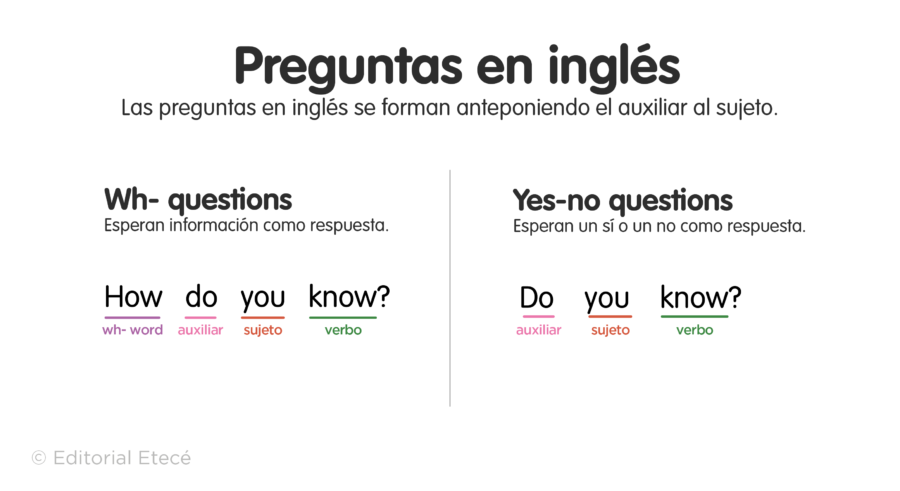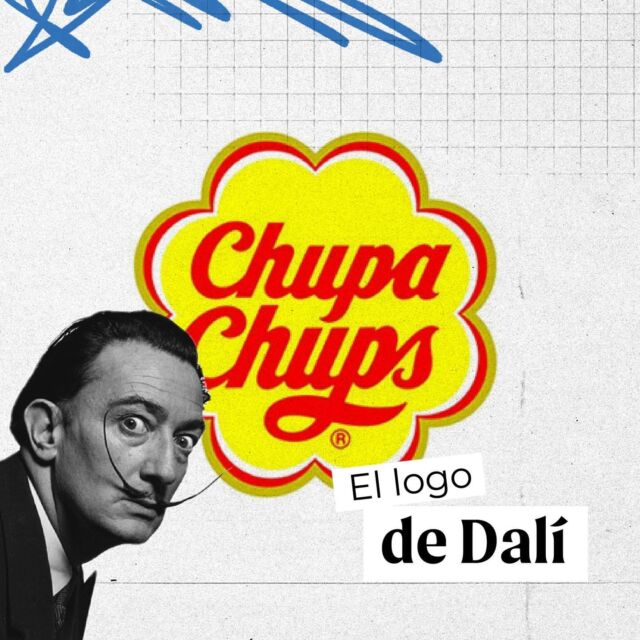Las yes / no questions en inglés son preguntas que esperan un “sí” o un “no” como respuesta (y no información, como las wh- questions). Las yes / no questions siempre empiezan con un auxiliar. Por ejemplo: Do you like pop music? / ¿Te gusta la música pop?
En las yes / no questions, al igual que en todas las preguntas en inglés, hay inversión entre el sujeto y el auxiliar. Por ejemplo: Have they met? (Y no: They have met?)
- Ver también: Preguntas wh- questions en inglés

Estructura de las yes / no questions
La estructura de las yes / no questions es:
Auxiliar + sujeto + verbo principal + ?
El auxiliar que comienza cada yes / no question cambia según el tiempo verbal y, en la mayoría de los casos, según la persona. Por ejemplo:
- Present simple. Por ejemplo: Does she work in a bank? / ¿Ella trabaja en un banco?
- Present continuous. Por ejemplo: Are you studying? / ¿Estás estudiando?
- Past simple. Por ejemplo: Did they visit the Louvre museum while in Paris? / ¿Visitaron el museo del Louvre cuando estuvieron en París?
- Present perfect. Por ejemplo: Have you tried sushi? / ¿Has probado el sushi?
- Future simple. Por ejemplo: Will he visit us? / ¿Nos visitará?
- Going to future. Por ejemplo: Are you going to finish on time? / ¿Vas a terminar a tiempo?
- Past perfect. Por ejemplo: Had you been to New York before this time? / ¿Ya habías estado en New York antes de esta vez?
- Modal verbs. Por ejemplo: Can she play the piano? / ¿Sabe tocar el piano?
Excepción: El verbo to be es el único verbo que no requiere de un auxiliar para formar las preguntas en present simple y past simple. Por ejemplo:
- Are you happy? / ¿Estás feliz? (present simple)
- Was he sick last week? / ¿Estuvo enfermo la semana pasada? (past simple)
Ver también: Oraciones interrogativas en inglés
Estructura de las respuestas cortas
Las respuestas cortas respetan la siguiente estructura:
Yes, + I, you, he, we, they + auxiliar positivo (según el tiempo verbal)
No, + I, you, he, we, they + auxiliar negativo (según el tiempo verbal)
Por ejemplo:
- Did you call Jane? Yes, I did. / No, I didn’t.
- Have you met John? Yes, I have. / No, I haven’t.
- Does she live in this neighborhood? Yes, she does. / No, she doesn’t.
Atención: Para formar la respuesta corta, se repite el auxiliar utilizado en la pregunta (y no el verbo principal). Por ejemplo: Do you like reading? Yes, I do. (Y no: Yes, I like).
Ejemplos de yes / no questions
Present simple: auxiliares do / does
- Do you like this shirt?
¿Te gusta esta camisa? - Does he play the piano?
¿Él toca el piano? - Do they always come here?
¿Siempre vienen aquí? - Does Sarah know the address?
¿Sarah conoce la dirección?
Past simple: auxiliar did
- Did you see the movie?
¿Viste la película? - Did I do something wrong?
¿Hice algo malo? - Did Sarah go to the party?
¿Sarah fue a la fiesta? - Did you call your brother?
¿Llamaste a tu hermano?
Verbo principal to be en present simple / past simple
- Are you on vacation?
¿Estás de vacaciones? - Is she at home?
¿Está ella en casa? - Was the party a lot of fun?
¿La fiesta estuvo muy divertida? - Were you sure about the answer?
¿Estabas seguro de la respuesta? - Were they ready for the trip?
¿Estaban listos para el viaje? - Am I too short?
¿Soy demasiado bajo? - Was the hotel nice?
¿Era lindo el hotel?
Present continuous / past continuous: auxiliar to be
- Are you thinking about traveling?
¿Estás pensando en viajar? - Were they playing the guitar?
¿Estaban tocando la guitarra? - Were the children screaming too loud?
¿Los niños estaban gritando muy fuerte? - Is she feeling alright?
¿Ella se siente bien? - Are they coming with us?
¿Ellos vendrán con nosotros? - Was I right in the end?
¿Yo tenía razón al final?
Future simple: auxiliar will
- Will you pick up the children from school?
¿Irás a buscar a los niños a la escuela? - Will they be ready on time?
¿Estarán listos a tiempo? - Will he talk to the boss today?
¿Hablará con el jefe hoy? - Will we visit Italy?
¿Visitaremos Italia?
Present perfect: auxiliares have / has
- Have you seen this show?
¿Has visto este programa? - Have they ever worked together before?
¿Han trabajado juntos alguna vez? - Has he been to Japan?
¿Él ha estado en Japón? - Have I told you this story before?
¿Te he contado esta historia antes? - Has this author written many books?
¿Este escritor ha escrito muchos libros?
Past perfect: auxiliar had
- Had they tried this food before?
¿Habían probado esta comida antes? - Had they already left before you arrived?
¿Ya se habían ido antes de que tú llegaras? - Had he seen the movie?
¿Había visto la película? - Had he already done it?
¿Ya lo había hecho?
Should: modal verb
- Should I use this paint for an outdoor table?
¿Debería usar esta pintura para una mesa de exterior? - Should we finish the test in an hour?
¿Deberíamos terminar el examen en una hora? - Should they believe him?
¿Deberían creerle? - Should we leave now to be there on time?
¿Deberíamos salir ahora para llegar a tiempo?
Must: modal verb
- Must dogs be on a leash at all times?
¿Los perros deben estar atados todo el tiempo? - Must we take off our shoes before we enter?
¿Debemos quitarnos los zapatos antes de entrar? - Must you go now?
¿Debes irte ahora? - Must he pay all these taxes?
¿Debe pagar todos estos impuestos?
Can: modal verb
- Can the children go to the park?
¿Los niños pueden ir al parque? - Can you set the table?
¿Puedes poner la mesa? - Can he run very fast?
¿Él puede correr muy rápido? - Can the cat eat regular food?
¿El gato puede comer comida normal?
Sigue con:





¿Te fue útil esta información?
Sí No¡Genial! gracias por visitarnos :)